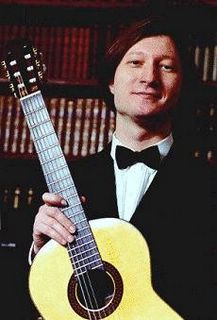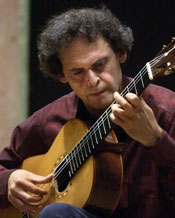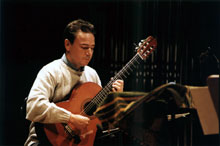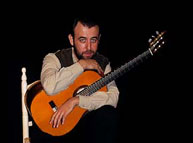
Classical guitarist Fabio Zanon was on tonight. He started the concert wonderfully with 3 Latin-American pieces. The first piece is
Triste no. 1 by composer Eduardo Fabini. An emotionally-charged piece of music to start off the evening and Fabio Zanon's style of playing brought out the spirit of the piece of music in the most wonderful way. The air resonates with the full spectrum of tone colours which he caressed out from his instrument, doing so with limited string noise. Such brazilian and Latin-American pieces fit just nicely with his personal style, though insufficient to recreate the atmosphere of Buenos Aires or Rio de Janeiro in the concert hall, but nonetheless enjoyable.
Also performing tonight is also special guest violinist Betina Maag Santos, who currently resides in Singapore. They performed the
Sonata Concertata in A by Niccolo Paganini. Very lovely piece of music with its heartwrenching melody and warm harmonies. That sure inspired me to play some chamber music in the near future. And I've gotten quite some interesting chamber pieces to prepare for the exams and competition next year. Anyways, I was surprised to learn that Betina Maag Santos learned under the legendary violinist Nathan Milstein.
After the interval, 6 of the
12 Studies by Francisco Mignone was on. I have always been skeptical of studies or etudes being played in performances and recordings, for the intentions for which they are written for should restrict them to the practice room, unless the mastery of the particular technique involved creates a most beautiful musical effect. Stefano Cardi had played 1 of the
12 Etudes by Villa Lobos the day before and I thought it'd be better substituted with a standard performance piece. Yet tonight, the 6 Studies were mostly well chosen, and reflects aspects of the Brazilian musical culture.
The finale program piece was marred by the artiste's excessive emotions. Ever tried practising a romantic piece of music and attempting to make it more emotional by trying out different ways to express or shape the phrases, but end up with a repulsive version of it? That's what happened to Ronaldo Miranda's
Appasionata. The excessive
rubato and dynamic changes were too much and even though Fabio Zanon seemed to be totally immersed in the music, the music which had been produced was outright repulsive. Simplicity is the idea, and that's what the piece lacks. From what I deduced of the music from his playing, the melody line could have been really passionate if he had taken extra care to control the dynamic difference of his melody and harmony. That's also what I've observed from his style. The melodies of some of his pieces had been obscured due to the almost similar volume he plays his harmonies and as a result, sounding a little messy. IF one had sang the melody out mentally, he or she would have realised how musically beautiful the piece could be if several aspects of his playing could be refined.
I really wished he didn't play the two encore pieces,
Torre Bermeja by Issac Albeniz and
Serenata Espanola by Malats. He made us feel as if he was rushing to end this concert and the beauty of two Spanish impressionistic pieces were thus utterly destroyed in his hands. What a pity. If he could have sticked to the way he played at the first half, it would be a much better concertgoing experience for the audience who were present...
Somehow, his music didn't touch me as much as the previous two guitarists, but his technical capability impressed me the most, which is something very superficial... Nevertheless, I did enjoy tonight's concert. =)





